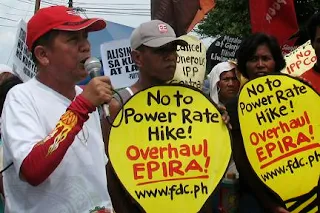Jan 01 2014 Philippine Suertres/Swertres Tips and Lotto Results
Bong Aceron
1/01/2014 11:41:00 AM
Who will regulate the regulators?
by Florangel Rosario Braid
December 31, 2013
In the midst of the controversy triggered by the power rate hike, the highest in recent history, several issues and lessons have emerged. These are the apparent absence of an “oversight” agency that can act on behalf of public interest; the absence of responsive leadership at the regulatory commission; perceived unconstitutionality of the EPIRA (Electric Power Industry Reform Act) law of 2001; absence of an empowered consumer movement; and what an economic analyst describes as the “perils of privatization and liberalization.” It confirms what many have suspected for sometime now – possible collusion among power generators, and demonstrates the power of public opinion.
A perceptive analysis by economic and political analyst Richard Javad Heydarian on the electricity crisis illustrates “how regulatory capture undermines emerging markets,” a response to two essays in the Foreign Affairs Magazine. One written by its editors describes the country as an “up-and-coming” emerging market and praises it for its “bold leadership in taking steps to address challenges” for improvements in transparency, efficiency in fiscal spending and tax administration, and its huge reserve of political capital which could be translated into swift and decisive reforms.” The other essay notes that the reforms, however, “have not cut deep enough” as the analysis failed to mention the impact of corruption scandals and the aftermath of the Haiyan crisis.
But Heydarian went further, citing learnings from the recent power crisis such as the “need for a stronger state that can bust oligarchic collusion and protect the interest of consumers and productive sectors of the economy. The power crisis, he notes, “is not a problem of excessive state intervention and public mismanagement, but an example of how economic liberalization under a corrupt political system and an absence of a competitive private sector, has handed the key sectors of the economy to a handful of oligarchs which have privatized profits over capacity building and accountability. He describes dangers of privatization in under-developed markets – especially those with “an oligarchic sector which lacks capital, expertise, and appreciation for collective interest but has unshakable grip on the political economy.” He continues: “The consequence is vulnerability to regulatory capture – a process by which major businesses and special interests capture a weak post-transition state in order to control profitable strategic enterprises previously held by government.”
Consumers have long suffered from high power rates, reported to be the highest in Asia and perhaps in the world. Thus, we cannot afford to ignore enlightened opinions some of which we already know but should be taken more seriously now – that there indeed is need to “empower our state institutions,” free our economy from the grip of oligarchs, “strengthen the emerging entrepreneurial class,” and establish a more “independent regulatory structure.” Other observers suggest giving back to the state control of critical and strategic resources like energy and water. Options such as these are worth exploring in Senate hearings and public forums.
The good news is that the Supreme Court has issued a temporary restraining order (TRO) on the electricity rate increase of R4.15 per kilowatt hour. Many hope that the ban would be made permanent, and the EPIRA law repealed. Several legislators have questioned decisions made by regulators and urged further review of EPIRA. The principal petitioners are from Bayan Muna, the Alliance of Concerned Teachers, and Pamalakaya, a fisherfolk alliance who believe that the law violates the rights of consumers to question rate increases. Akbayan with some NGOs are campaigning to overhaul the EPIRA.
Read More
Level ng #cholesterol ay naka-link sa maagang mga palatandaan ng Alzheimer sa utak.
These are today's Suertres/Swertres Lotto tips;
Yesterday's results are at the bottom
005
019*
077
358
359*
238
369*
489**
389**
589**
----
014**
012**
179*
149*
Yesterday's Philippine PCSO Draw Results
For December 31, 2013 Tuesday
EZ2 Two Lotto
Morning edition 11am: 06-25
Afternoon edition 4pm: 20-15
Evening edition 9pm: 06-17
Winning numbers in exact order
Php 4,000.00 per 10 peso play
Swertres 3 Lotto Luzon Vis-Min
Morning edition 11:00 am: 9-1-0
Afternoon edition 4:00 pm: 9-7-1
Evening edition 9:00 pm: 8-5-9
Winning numbers in exact order
Php: 4,500 per 10 peso play
Six 6 Digit Luzon
9pm: 5-6-6-0-0-6
Winning numbers in exact order
BINGO Milyonaryo
9pm: B = 4 I = 9 N = 6 G = 6 O = 08 M = 05
Winning numbers in exact order
6/42 National Lottery
29-14-41-19-38-37
Current Jackpot: Php 8,477,020.00
(0)winner
Winning numbers in any order
Super 6/49 Nationwide Lotto
44-34-09-49-12-26
Current Jackpot: Php 16,000,000.00
(0)winner
Winning numbers in any order
For best results, it is suggested to always employ rumble on the tips above.
* = Hot Numbers
** = Very Hot Numbers
links
Most Popular

No winner of P198M Grand lotto jackpot
9/04/2012 12:56:00 PM

December 23 2012 Philippine Suertres/Swertres Tips and Lotto Results
12/23/2012 11:18:00 AM

September 05 2012 Philippine Suertres/Swertres Tips and Lotto Results
9/05/2012 12:09:00 PM

November 11 2012 Philippine Suertres/Swertres Tips and Lotto Results
11/11/2012 12:44:00 PM

Suertres Tips/Swertres Tips of the Philippines and Lotto Results Today - Sep 16 2014
9/16/2014 12:12:00 PM

December 21 2012 Philippine Suertres/Swertres Tips and Lotto Results
12/21/2012 11:07:00 AM

Philippine Suertres Lotto Tips and Results. Now, You're playing with Power | http://tiny.cc/suertrestips | https://facebook.com/suertrestips
Footer Menu Widget
Designed with by Blogger | Online Since February 14, 2006



Social Plugin